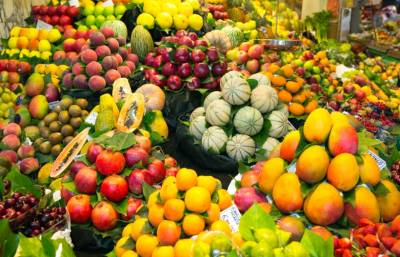DrCarney.com Blog
Is the Fructose in Fruit Bad for Us?
We've all heard that fructose is the sugar in fruit. But high fructose corn syrup contains 55% fructose... and we all know that we should avoid this highly refined sugar. So it begs the question, is the sugar (fructose) in fruit bad for us? Dr. Michael Greger cuts through the confusion in the below video, If Fructose is Bad, What About Fruit?
Dr. Greger sorts through several scientific studies and demonstrates how the fructose in fruit does not produce hypoglycemic effects like other added sugars. Unlike refined or other concentrated sugars, nature packages the sugar in fruit with fiber and hundreds of nutrients--including antioxidants. The soluble fiber in fruit acts like a gel, and slows down the absorption of sugar into the bloodstream which prevents spikes and dips in blood sugar. In contrast, when refined and concentrated sugars are consumed without the added fiber and nutrients, blood sugar levels rise quickly. As the body recognizes this sudden surge in blood sugar, the pancreas releases insulin. As a result, blood sugar levels can plummet, creating hypoglycemic symptoms. Says Dr. Greger, "Blood sugar just [goes] up and down [with fruit] without that overshoot, and without the surge of fat into the blood."
Additionally, Dr. Greger emphasizes that only industrial fructose like high fructose corn syrup is associated with adverse health effects like liver disease and fructose in the form of added sugar can exacerbate hypertension, but not the naturally occurring fructose in fruit.
It's important to keep in mind that surges of insulin encourages fat storage. Thus, keeping our blood sugar stable without spikes and dips helps us not only to maintain a healthy weight, it helps to maintain steady blood sugar levels for diabetic patients. There is one caveat however. Some fruits like pineapple and watermelon can produce a higher glycemic load, so some sensitive indivduals who are reversing a serious illness and following my Starch-Smartest program are encouraged to consume fruits from the northern hemisphere such as apples, pears, plums, cherries and berries, etc. to maintain safe blood sugar levels. For these individuals, tropical fruits should also be restricted to special treats early in the day and eaten with other high-fiber whole plant foods to minimize the glycemic load.
The bottom line is that the naturally occurring fructose in fruit comes packaged with many beneficial properties and can be enjoyed as part of a whole-food, plant-based diet. Pears, persimmons, and pomegranates--and all other fruits--are nature's perfect way for satisfying our sweet tooth and preserving our health.
For more information, click on the following links:
(1) Sugary Drinks Linked to 180,000 Deaths Worldwide
(3) How do Natural Sugars Compare with Table Sugar?
(4) How Big Industries Keep You Coming Back for More
(5) Food Processing Made Simple
(6) Effects of Sugar Similar to Drug Addiction
Video Credit: If Fructose is Bad, What About Fruit? - NutritionFacts.org
Michael Greger MD Links
Preview the "Diabetes in Retreat" Trailer
No More Meds?: Got a family history? Outsmart it! Decrease your need for medication naturally with Dr. Carney. Her patients can REVERSE Diabetes Type II. Which foods worsen insulin resistance? Find out now. Get the keys to lowering your insulin resistance with her proven methods for success. Finally, an MD who helps even Type 1 diabetics reduce insulin requirements using her Starch-Smart® System, a science-based plan to help you normalize weight and blood sugars.
When you subscribe to the blog, we will send you an e-mail when there are new updates on the site so you wouldn't miss them.




